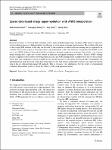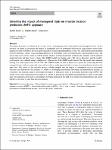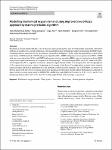Search
Author
- Adeleh, Asemi (1)
- Adnan, Rana Muhammad (1)
- Andrea, Ko (1)
- Asefeh, Asemi (1)
- next >
Subject
- BOD (1)
- input data (1)
- IoT (1)
- ISR (1)
- next >
Date issued
Has File(s)
- true (4)
Search Results
Image processing is a very broad field containing various areas, including image super-resolution (ISR) which re-represents a low-resolution image as a high-resolution one through a certain means of image transformation. The problem with most of the existing ISR methods is that they are devised for the condition in which sufficient training data is expected to be available. This article proposes a new approach for sparse data-based (rather than sufficient training data-based) ISR, by the use of an ANFIS (Adaptive Network-based Fuzzy Inference System) interpolation technique. |
Investment decisions are influenced by various factors, including personal characteristics and managerial issues. In this research, we aimed to investigate the impact of managerial traits on investment decisions by using adaptive neuro-fuzzy inference system (ANFIS) to develop a personalized investment recommendation system. We collected data from potential investors through a survey, which included questions on investment-types, investment habits, and managerial traits. The survey data were used to create an ANFIS model, which is a hybrid model that combines the strengths of both artificial neural networks and fuzzy logic systems. The ANFIS model was trained using 1542 survey data pairs, and the model's performance was evaluated using a validation set. The results of the ANFIS mode... |
The risk-based access control model is one of the dynamic models that use the security risk as a criterion to decide the access decision for each access request. This model permits or denies access requests dynamically based on the estimated risk value. The essential stage of implementing this model is the risk estimation process. This process is based on estimating the possibility of information leakage and the value of that information. Several researchers utilized different methods for risk estimation but most of these methods were based on qualitative measures, which cannot suit the access control context that needs numeric and precise risk values to decide either granting or denying access. Therefore, this paper presents a novel Adaptive Neuro-Fuzzy Inference System (ANFIS) mod... |
Biochemical oxygen demand (BOD) is one of the most important parameters used for water quality assessment. Alternative methods are essential for accurately prediction of this parameter because the traditional method in predicting the BOD is time-consuming and it is inaccurate due to inconstancies in microbial multiplicity. In this study, the applicability of four hybrid neuro-fuzzy (ANFIS) methods, ANFIS with genetic algorithm (GA), ANFIS with particle swarm optimization (PSO), ANFIS with sine cosine algorithm (SCA), and ANFIS with marine predators algorithm (MPA), was investigated in predicting BOD using distinct input combinations such as potential of hydrogen (pH), dissolved oxygen (DO), electrical conductivity (EC), water temperature (WT), suspended solids (SS), chemical oxygen ... |




